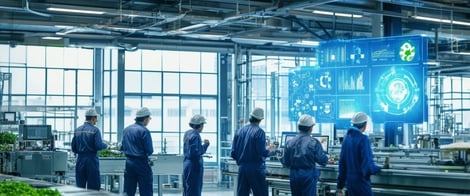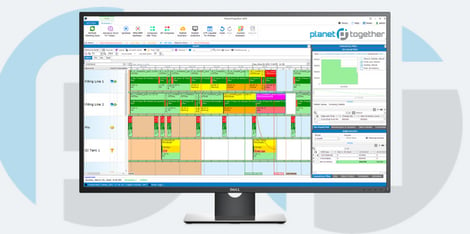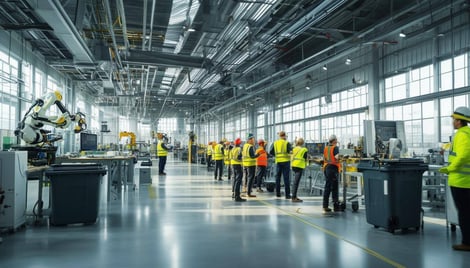Greener Horizons: How Production Planners Can Drive Eco-friendly Manufacturing with Smart Integrations
As environmental regulations tighten and consumer demand for eco-friendly products grows, production planners must take the lead in implementing sustainable practices. With the integration of advanced software solutions like PlanetTogether and enterprise systems such as SAP, Oracle, Microsoft, Kinaxis, or Aveva, achieving eco-friendly goals is now more feasible than ever.
This blog explores how production planners in industrial manufacturing can adopt eco-friendly practices while leveraging technology to streamline operations, reduce waste, and enhance efficiency.

The Importance of Eco-friendly Practices in Industrial Manufacturing
Industrial manufacturing has historically been resource-intensive, consuming vast amounts of energy, water, and raw materials. However, this sector also holds significant potential to make impactful changes through eco-friendly practices. Benefits of such practices include:
Cost savings: Efficient resource use leads to reduced operational costs.
Regulatory compliance: Staying ahead of environmental laws and policies mitigates risk.
Enhanced brand reputation: Eco-consciousness attracts customers and investors.
Innovation opportunities: Green practices often spur creative solutions and technological advancements.
As a production planner, your role is pivotal in ensuring these benefits are realized through effective planning and resource allocation.

Eco-friendly Practices to Implement
1. Lean Manufacturing Principles
Lean manufacturing focuses on minimizing waste while maximizing productivity. For production planners, this means:
Optimizing production schedules to reduce energy consumption.
Identifying and eliminating bottlenecks that cause resource waste.
Ensuring just-in-time (JIT) inventory to minimize material overstock and spoilage.
With tools like PlanetTogether integrated with SAP or Oracle, you can create schedules that align production with demand, reducing unnecessary resource use.
2. Energy-efficient Production
Reducing energy usage is one of the most significant steps toward sustainability. Implement practices such as:
Scheduling energy-intensive processes during off-peak hours.
Monitoring and analyzing energy consumption across facilities.
Transitioning to renewable energy sources where possible.
Systems like Microsoft Dynamics 365 can work alongside PlanetTogether to provide real-time energy consumption data, helping you plan operations more effectively.
3. Waste Reduction
Waste in manufacturing includes not only material waste but also time and energy waste. Strategies include:
Recycling by-products or integrating closed-loop systems.
Using predictive analytics to prevent overproduction.
Monitoring and adjusting for defects during production to reduce scrap.
PlanetTogether's advanced planning and scheduling (APS) features can integrate with Kinaxis to track waste metrics, helping planners make informed decisions to reduce scrap and rework.
4. Sustainable Materials
Source eco-friendly materials and ensure optimal usage. For instance:
Use recycled or biodegradable materials where applicable.
Partner with suppliers committed to sustainable practices.
Plan material usage to avoid excess inventory.
Aveva’s integration with PlanetTogether enables visualization of the entire supply chain, helping you ensure materials are sustainably sourced and efficiently used.
5. Carbon Footprint Monitoring
Every production planner should track and aim to reduce their facility's carbon footprint. Steps include:
Monitoring emissions at each production stage.
Optimizing transportation routes for raw materials and finished goods.
Switching to energy-efficient machinery and processes.
With integrated systems like PlanetTogether and SAP, you can generate reports on emissions and energy usage, providing actionable insights to lower your facility’s carbon footprint.

Leveraging Technology for Sustainability
Technology is the cornerstone of sustainable manufacturing. Integrated software solutions make it possible to plan, monitor, and optimize production processes with precision. Here's how you can leverage key integrations to drive eco-friendly practices:
PlanetTogether and SAP Integration
SAP’s enterprise resource planning (ERP) capabilities combined with PlanetTogether’s APS system provide a powerful solution for sustainable production planning. SAP handles resource data, while PlanetTogether uses this information to create optimized production schedules. For example, aligning production with renewable energy availability or minimizing downtime reduces overall resource waste.
PlanetTogether and Oracle Integration
Oracle’s supply chain management tools integrated with PlanetTogether can help you forecast demand more accurately, reducing overproduction and waste. For instance, using predictive analytics, you can align production schedules with seasonal demand fluctuations, minimizing excess inventory and associated waste.
PlanetTogether and Microsoft Dynamics Integration
Microsoft Dynamics provides real-time data analytics and insights into operational efficiency. When integrated with PlanetTogether, it allows production planners to identify inefficiencies in energy usage, track material waste, and optimize scheduling to align with eco-friendly goals. Imagine using IoT data from Dynamics to adjust machine loads and schedules dynamically, reducing peak energy consumption.
PlanetTogether and Kinaxis Integration
Kinaxis’ rapid response capabilities ensure you can quickly adapt to disruptions, such as material shortages or demand spikes, without overproducing. PlanetTogether’s scheduling tools complement this by creating adaptive, efficient production plans that reduce resource waste.
PlanetTogether and Aveva Integration
Aveva’s digital twin technology, when paired with PlanetTogether, enables you to simulate production scenarios to identify the most sustainable approach. For instance, you can model the impact of using alternative materials or adjusting production timelines on energy consumption and waste generation.
Challenges and Solutions
While the integration of eco-friendly practices and technology is promising, challenges remain. Here’s how production planners can overcome them:
Challenge: Resistance to Change
Many employees and stakeholders may resist adopting new technologies or practices.
Solution: Provide training and communicate the long-term benefits of sustainability. Highlight cost savings, regulatory compliance, and enhanced reputation.
Challenge: Initial Costs
Upgrading to energy-efficient equipment or implementing new systems can be expensive.
Solution: Leverage financial incentives like government grants for sustainable practices. Focus on the long-term ROI of reduced operational costs.
Challenge: Data Overload
With multiple systems in place, managing and interpreting data can be overwhelming.
Solution: Use integrated platforms like PlanetTogether and Aveva to consolidate data and provide actionable insights in user-friendly dashboards.
Eco-friendly practices are no longer optional—they are a vital part of modern industrial manufacturing. As a production planner, you have the tools and strategies at your disposal to make a significant impact. By leveraging integrations between PlanetTogether and ERP Systems like SAP, Oracle, Microsoft, Kinaxis, or Aveva, you can optimize processes, reduce waste, and drive your facility toward a sustainable future.
The journey to sustainability may require effort, but the rewards—for your business, the planet, and future generations—are well worth it. Take the first step today, and let technology guide you toward greener pastures.
Are you ready to take your manufacturing operations to the next level? Contact us today to learn more about how PlanetTogether can help you achieve your goals and drive success in your industry.
Topics: Waste Reduction, Industrial Manufacturing, Sustainable Materials, PlanetTogether Software, Integrating PlanetTogether, Lean Manufacturing Principles, Energy-efficiency Production, Carbon Footprint Monitoring





















LEAVE A COMMENT